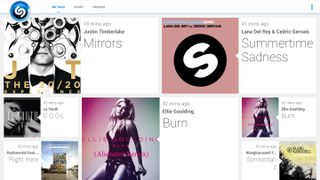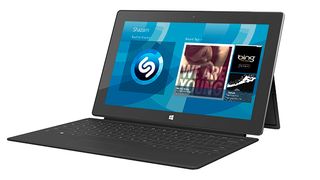The evolution of Shazam: from music maestro to TV tagging
Can Shazam become the only app you need for TV?
According to Danker, Shazam is forging itself into the ultimate second screen experience for TV, even though he admits he hates the phrase.
"I am not happy with calling it 'second screen' - we have to remain human here," said Danker.
"Try to picture any of these sentences being muttered by someone not in the industry: 'what we need now is that second screen' or 'what we need is that social TV app'. No!
"What people do say is: 'I really want to share this with my friend' or 'I really want to know who this actor is'.
"The beauty of Shazam is that it has become a verb. I don't use the words companion app, social app, second screen app, what people want is to Shazam it, so they can get more out of it. We don't need to label it. Let's follow what the users are saying."
Questions asked
And the users are talking - they are asking a lot of pretty simple questions.
"Who is the actor? What else have they been in? How do I get that product? These are all super common," said Danker who explained that this also stretched to TV advertising.
Get daily insight, inspiration and deals in your inbox
Get the hottest deals available in your inbox plus news, reviews, opinion, analysis and more from the TechRadar team.
"This whole notion that TV advertising is something you need to suffer through to get TV isn't how we view it at Shazam. Just like people only Shazaming the music they are interested in, no one in their lives have ever Shazamed an ad that they didn't want.
"The only people Shazaming ads are those who want to know more. This is a natural scenario where Shazam can add value. We don't want to pepper your life with things you are not interested in, but we do want to offer stuff you are interested in."

Shazam is certainly not the first company to try its hand at offering apps for television. In fact another BBC veteran, Anthony Rose, heads up Zeebox a real-time social TV rival to Shazam. But Danker believes that TV apps that rely on real-time television are flawed from the outset.
"If you Shazam a show or an ad when it is live or when it aired a week ago, you get the same quality of experience," said Danker.
"Television channels see creating apps as a liability"
"We don't depend on it all being live. That's important as we don't want to force users using our product when they are watching live TV only. That is an inherent problem with social apps. What is the conversation right now? If I am five-minutes time delayed then this shifts from being a potential value add to a spoiler.
"On average people will pause a programme six times every hour and yet you think you are watching it live. You are not. Think about a Super Bowl party where you saw a great play, did an instant replay and skipped back. Now you are 30, 40, 50 seconds off of live and you have an app on your phone that shows you what happens live - that's awful.
"We get to synchronise with the very moment."
TV's transitions phase
With Shazam betting so much on TV watchers using an app while watching television, you would think that the market for second screen television apps was a rosy one, but even Danker admits it is not.

"Television channels see creating apps as a liability as it is not helping their bottom line. So we are in a transition phase, we are still in a place with TV programmers where they are not sure whether they should be doing these apps themselves."
Danker gives the example of ABC which recently announced that it was no longer supporting its second screen app but agrees it is the best thing ABC could do as it "is too expensive and it is not delivering the results".
"Live TV is an inherent problem with social apps"
"But what if they took the content they already have, give it to Shazam we can take away the cost and complexity," he said. "We can give them more users and it makes sense for them."
So, what does the future hold for Shazam? A simpler experience, according to Danker. Given that Shazam is an app with one big button you would think that it would be difficult to make is simpler but Danker will try.
"When your goal is to be effortless and simple to the user, then the more things you can peel away the better," Danker explained.
"While I celebrate the fact that we are one button I always ask: do we need to be a button, can we remove the button?
"Our mission is to help people recognise and engage with the world around them. We are not just focused on music and television, but that is where we are starting."
- Want to know the apps Apple iTV will need to succeed? Check them out here
Marc Chacksfield is the Editor In Chief, Shortlist.com at DC Thomson. He started out life as a movie writer for numerous (now defunct) magazines and soon found himself online - editing a gaggle of gadget sites, including TechRadar, Digital Camera World and Tom's Guide UK. At Shortlist you'll find him mostly writing about movies and tech, so no change there then.

